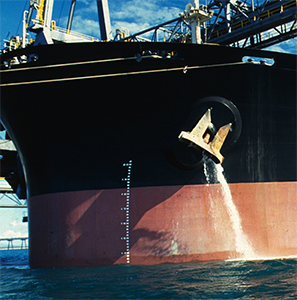One of the five U.S.-based independent labs testing ballast water management systems (BWMS) is suspending its evaluations, citing regulatory flaws that have resulted in “significant uncertainties” about the quality of the results.
In December, the Maritime Environmental Resource Center (MERC), part of the University of Maryland Center for Environmental Science (UMCES), announced that it would finish testing devices for which it was contracted, but would not undertake any new testing under the current regulatory plan.
Dr. Mario Tamburri, director of MERC and a UMCES research professor, said the testing regimen lacks a standardized approach and oversight, which “has undermined the goal of national and international policies to prevent the introduction of environmentally and economically destructive invasive species.”
Tamburri said deficiencies in the International Maritime Organization (IMO) G8 Guidelines and the U.S. Coast Guard independent laboratory certification testing process have resulted in “significant uncertainties,” throwing the quality of test results into doubt. The uncertainties put at risk the “scientific integrity and reputation” of both the UMCES and MERC, he said.
“MERC has a deep understanding of the complexities and challenges associated with testing ballast water management systems against specific discharge standards,” Tamburri said in the announcement. “While perfection is unrealistic, it is possible to be rigorous, consistent and transparent when testing BWMS, which is necessary for the regulations to succeed.”
Tamburri said both the IMO and Coast Guard testing schemes allow test facilities to ignore live larvae of zebra mussels and other mollusks, eggs of various species and large algal cells simply because they often don’t or naturally cannot move on their own. Under current regulations, these organisms can be presumed dead, but other basic tests can show that these non-moving organisms are actually living and viable. That means water treated with a certified BWMS may not significantly reduce the threat of introduction of new species, the announcement said.
Baltimore-based MERC is one of five labs approved to test BWMS for U.S. type approval under the auspices of NSF International. MERC has tested systems that ultimately sought final type approval from other labs. The Coast Guard is not actively seeking a replacement lab, but it invites independent labs to apply to become accepted to perform BWMS testing, said Coast Guard spokeswoman Lt. Amy Midgett.
At this point, the Coast Guard’s type-approval process remains unchanged.
“The ballast water management system testing protocol, referenced in the ballast water management regulations, was developed by the EPA’s Environmental Technology Verification (ETV) Technical Panel, an independent group of experts with scientific and technical expertise in various ballast water issues,” Midgett said. “This group determined which testing protocol was most appropriate, and the panel independently validated it before it was incorporated into the ballast water management regulation.”
However, the Coast Guard is working with the EPA panel to review and consider updates to ballast water testing procedures.
“If this group does establish a new testing protocol, the Coast Guard would then work to implement commensurate changes to our policies and/or regulations,” Midgett said.

